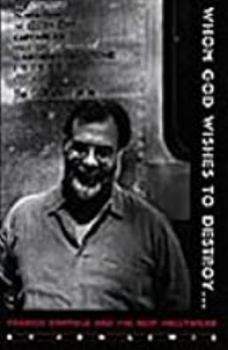Whom God Wishes to Destroy . . .: Francis Coppola and the New Hollywood
Select Format
Select Condition 
Book Overview
In March 1980 Francis Coppola purchased the dilapidated Hollywood General Studios facility with the hope and dream of creating a radically new kind of studio, one that would revolutionize filmmaking, challenge the established studio machinery, and, most importantly, allow him to make movies as he wished. With this event at the center of Whom God Wishes to Destroy, Jon Lewis offers a behind-the-scenes view of Coppola's struggle--that of the industry's best-known auteur--against the changing realities of the New Hollywood of the 1980s. Presenting a Hollywood history steeped in the trade news, rumor, and gossip that propel the industry, Lewis unfolds a lesson about power, ownership, and the role of the auteur in the American cinema. From before the success of The Godfather to the eventual triumph of Apocalypse Now, through the critical upheaval of the 1980s with movies like Rumble Fish, Hammett, Peggy Sue Got Married, to the 1990s and the making of Bram Stoker's Dracula and Kenneth Branagh's Frankenstein, Francis Coppola's career becomes the lens through which Lewis examines the nature of making movies and doing business in Hollywood today.
Format:Hardcover
Language:English
ISBN:0822316021
ISBN13:9780822316022
Release Date:June 1995
Publisher:Duke University Press
Length:208 Pages
Weight:1.35 lbs.
Dimensions:0.8" x 6.2" x 9.6"
Customer Reviews
2 ratings
Hollywood is hidden, Lewis Finds it
Published by Thriftbooks.com User , 18 years ago
I read this book as part of research I was doing on movies and culture. Most of the books were dry as a desert mummy and required a lot of fortitude and tenacity to read. This book, however, was composed well. Before I knew it, I had read the first three chapters. It's well-researched, thrilling to read, insightful, and probably has the best portrayal of what it takes to put together a multi-million-dollar movie - a process that remains largely hidden from the public at large. Films are too influential in our culture; it's a healthy dose of realism to know that a writer who wrote about truth, honesty and love had his/her script picked up by people who didn't possess any of those things. It's hard to hold honor over several mil - but it makes for great storytelling!
A look at studios v. autuers
Published by Thriftbooks.com User , 26 years ago
This is a true exposure of the battles that raged between studios and autuers in the 60's-70's. By using one of the most notable of the autuers of the time, Lewis, paints an indepth and at the same time entertaining look at the workings of film making.






